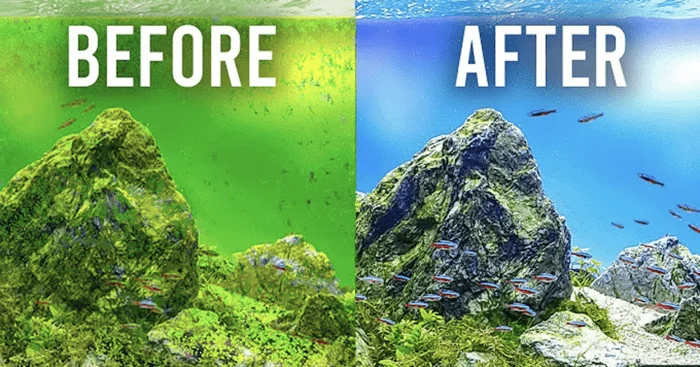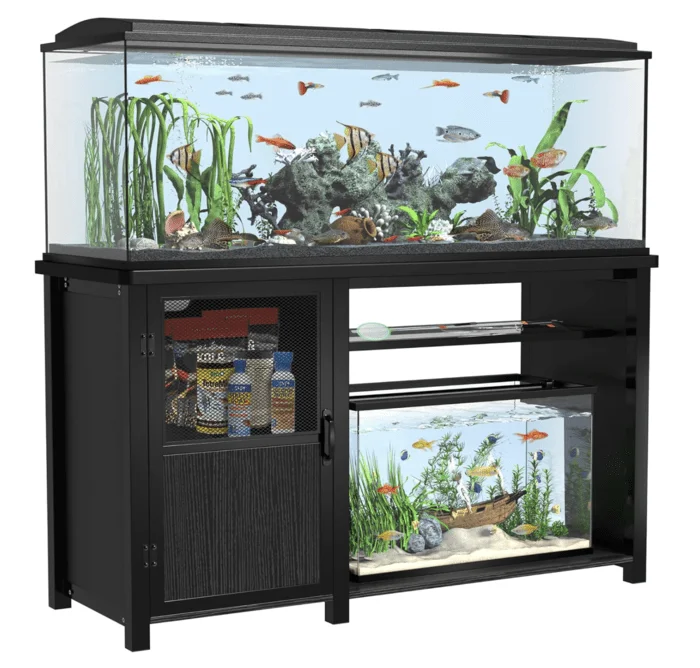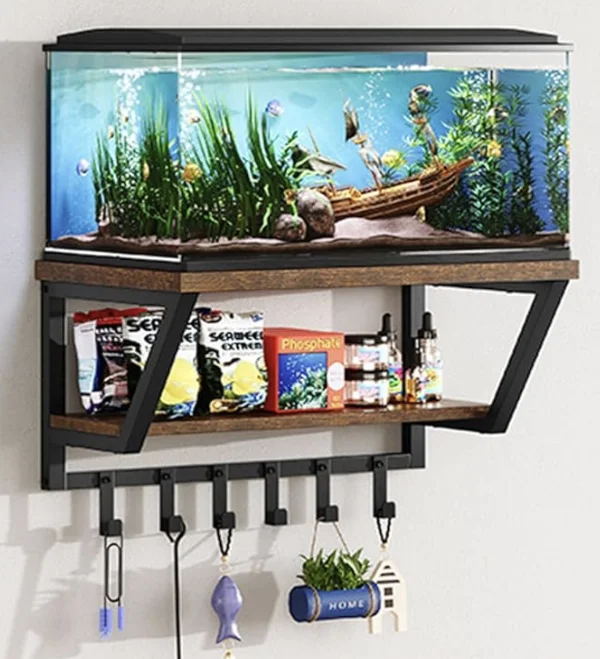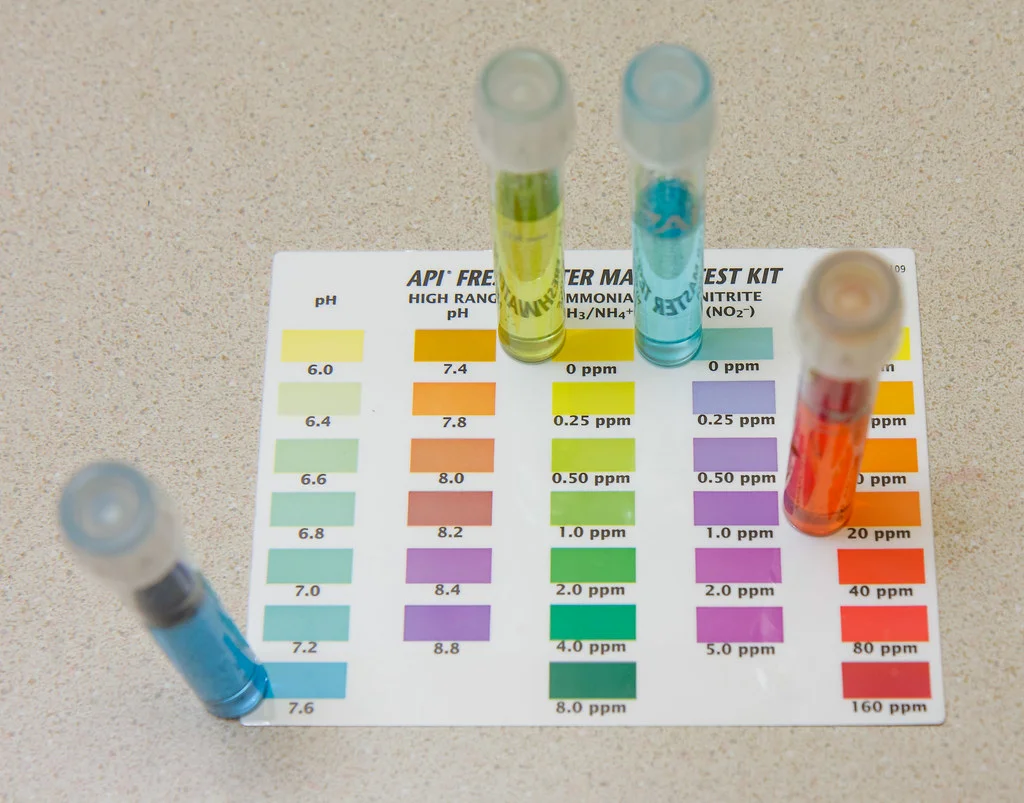Can Tetra Eat Frozen Fish Food?

This comprehensive guide addresses the question, Can tetra eat frozen fish food?
It is designed for tetra fish owners seeking information on the safety and health benefits of feeding their fish frozen fish food.
The guide discusses the advantages of using frozen fish food for tetras, the various types available in the market, recommended brands, methods for feeding tetras frozen fish food, and strategies for successfully introducing tetras to frozen fish food.
Whether you are a novice or experienced tetra owner, this guide will provide answers to all your questions regarding feeding your tetras frozen fish food.
.jpg_00.jpeg)
Key Takeaways:
- Tetras can eat frozen fish food and it offers numerous benefits such as providing a varied and nutrient-rich diet for optimal health.
- There are various types of frozen fish food available, with some recommended brands including Hikari and Omega One.
- Successfully introducing frozen fish food to Tetras may require patience and gradual transition, but it can be done with proper strategies and precautions.
Can Tetras Eat Frozen Fish Food?
Tetra Guide, a company that offers comprehensive care information for various tetra species, addresses the query regarding whether tetras can consume frozen fish food.
This type of food includes a variety of nutrient-rich aquatic organisms such as brine shrimp and bloodworms, commonly used as dietary supplements for aquarium fish.
Benefits of Frozen Fish Food for Tetras
Frozen fish food provides important nutrients, protein, and vitamins for tetras to enhance their overall health and feeding behavior.
This type of food offers a superior nutritional profile compared to some dry foods, as the freezing process helps preserve natural levels of vitamins and minerals.
Frozen fish food is convenient to store and typically has a longer shelf life, making it easier for owners to ensure a consistent food supply for their fish.
The nutrients in frozen fish food aid in supporting the immune system of tetras, promoting their growth, and intensifying their natural coloring, thereby enhancing the visual appeal of a vibrant aquarium environment.
.jpg_01.jpeg)
Types of Frozen Fish Food
Frozen fish food for tetras consists of brine shrimp, bloodworms, daphnia, krill, and silversides, each offering nutritional benefits such as high proteins, vitamins, and omega-3 fatty acids.
Brine shrimp is high in protein, promoting growth and vitality in tetras. Bloodworms are rich in essential nutrients and antioxidants, enhancing coloration and overall health.
Daphnia provides natural fiber, aiding digestion and preventing constipation in these small fish. Krill contains omega-3 fatty acids, boosting tetras’ immune system and reproductive health. Silversides, high in fat, provide energy and help tetras maintain a healthy weight.
Comparison of Different Frozen Fish Food Options
When comparing different frozen fish food options such as brine shrimp, bloodworms, daphnia, and mysis shrimpfor tetras, it is best to consider their protein content, ease of feeding, and acceptance by the fish. Brine shrimp are high in protein and are favored by tetras requiring a high-protein diet.
Bloodworms, rich in fatty acids, can enhance the coloration of tetras. Daphnia are suitable for tetras that prefer smaller prey, while mysis shrimp offer a good balance of protein and essential nutrients for overall tetra health.
Choosing frozen fish food options that closely resemble the natural diet of tetras in the wild is important to support their proper growth and vitality.
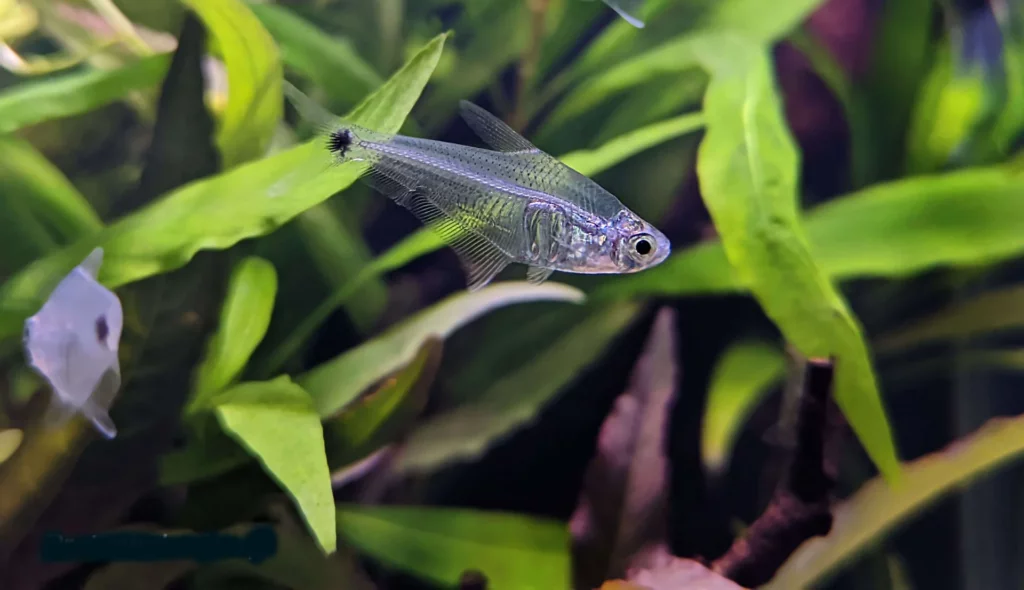
Recommended Frozen Fish Food Brands for Tetras
Some of the top brands offering frozen fish food for tetras that provide optimal nutrients and vitamins include high-quality options from Hikari, Omega One, and San Francisco Bay. These brands are renowned for their premium quality frozen fish foods specifically designed for tetras.
Hikari offers a diverse range of frozen fish foods, such as Tetra Blood Worms, known for enhancing color vibrancy and growth in tetras.
Omega One provides a selection of frozen fish food options rich in natural ingredients to promote the health of tetras. San Francisco Bay is popular for its fresh and nutritionally valuable frozen fish foods, ensuring a well-balanced diet for tetras.
Choosing products from these brands guarantees that you are offering the best possible nutrition for your tetras.
How to Feed Frozen Fish Food to Tetras
To feed frozen fish food to tetras correctly, follow specific measures and thawing techniques to maintain the food’s safety and appeal for the fish. Begin by taking out only the amount needed for a single feeding session to avoid wastage.
Thaw the frozen cubes by placing them in a small container of aquarium water; avoid using hot water to prevent nutrient loss. Allow the cubes to thaw at room temperature or in the refrigerator for a gradual thaw, ensuring the outer layers do not break down before the inside is fully thawed. Once the cubes have softened, use a small spoon or dropper to dispense the food into the aquarium, making it easier to prevent overfeeding.
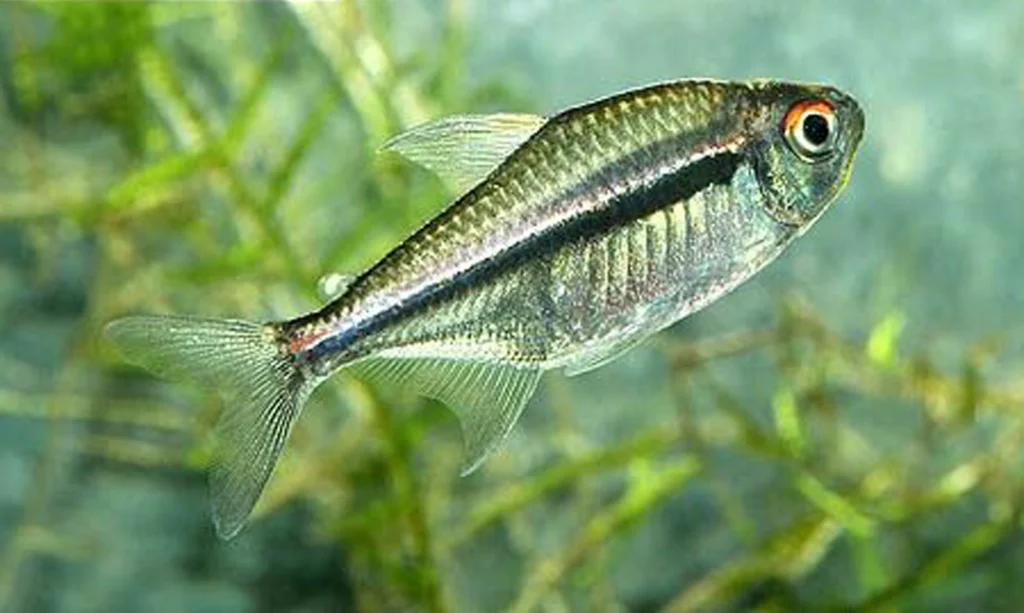
Step-by-Step Guide to Feeding Tetra Frozen Fish Food
When feeding tetra frozen fish food, thaw the food in a small container with aquarium water and allow it to reach room temperature before offering it to the fish.
Once the food is thawed, use a pipette or small feeding spoon to gently add small amounts to the aquarium. It is essential to closely observe the fish during feeding to ensure they are consuming the food and to remove any uneaten food after a few minutes to preserve water quality.
Avoid overfeeding, as any leftover food can contaminate the water. Gradually increase the frequency of feeding frozen fish food to tetras as they become more accustomed to the new diet. Begin by feeding once a day and adjust based on the tetras’ appetite.
Tips for Ensuring Tetras Consume Frozen Fish Food
To ensure that tetra eat frozen fish food, you can monitor their feeding behavior and utilize target feeding techniquesto ensure their consumption.
By observing the type of food tetras prefer and adjusting their diet to incorporate more frozen fish food, you can encourage their acceptance of it. Implementing a structured feeding schedule can increase the likelihood of the fish eating frozen fish food.
Target feeding involves directly feeding fish using a pipette or feeding ring to deliver food individually to tetras, allowing them to feed without interference from other tank mates.
This approach can be particularly beneficial for timid or slower tetras who may struggle to compete for food during regular feeding times.
Can Tetras Easily Adapt to Frozen Fish Food?
Most tetras can consume frozen fish food without significant issues, although there may be variations in feeding behavior among species.
Some tetras readily consume frozen fish food, while others may require some encouragement. For instance, neons and cardinals typically adapt to frozen food quickly, whereas more selective species like rummynose tetras may take longer to adjust.
To accommodate these differences, the recommended approach is to offer a variety of foods in small portions. Introduce frozen food gradually alongside their regular diet to encourage acceptance. Over time, most tetras are likely to embrace frozen fish food, enriching their diet with a diverse array of nutrients.
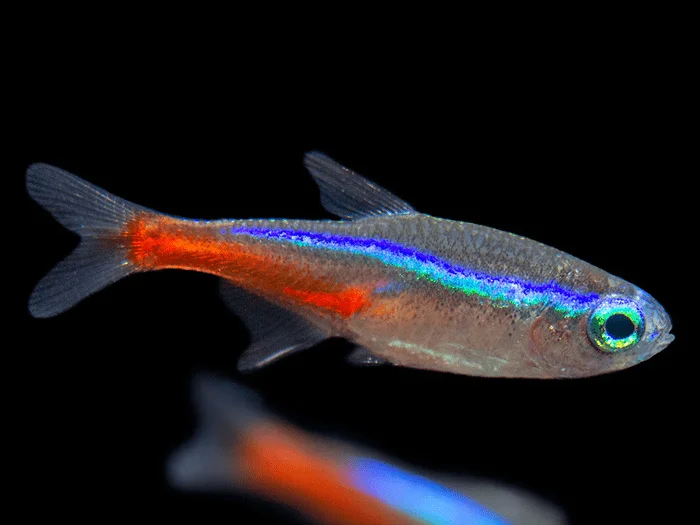
Common Challenges Encountered when Transitioning Tetras to Frozen Fish Food
Transitioning tetras to frozen fish food presents two main challenges: their reluctance to try the new food and initial digestive issues. To address the reluctance issue, gradually introduce the food alongside their existing diet by offering a small amount of the frozen food mixed with their regular pellets or flakes.
This method helps the tetras become accustomed to the taste and texture of the frozen food. To prevent digestive issues, ensure that the frozen food is fully thawed before feeding it to the tetras, as this can aid in easier digestion.
Opting for high-quality frozen foods suitable for tetras is essential for maintaining their long-term health and well-being.
Strategies for Successfully Introducing Frozen Fish Food to Tetras
To successfully introduce frozen fish food to tetras, a gradual approach and close monitoring of their feeding behavior are essential.
This slow incorporation method aims to prevent stress and related health issues by allowing the fish to adapt to the new diet. Starting with small amounts of frozen fish food mixed with their regular food helps tetras become accustomed to the taste and texture over time.
It is crucial to observe their response to the new food, being mindful of signs such as a lack of appetite or overeating. Adjusting the quantity of food as needed ensures that tetras are consuming a well-balanced diet that includes frozen fish food.
.jpg_10.jpeg)
Frequency and Quantity of Frozen Fish Food for Tetras
The frequency and quantity of frozen fish food for tetras are crucial in ensuring they maintain a well-rounded diet and receive the necessary nutrients. Tetras should be fed small amounts of frozen fish food two to three times per day, making sure to offer only what they can consume within a couple of minutes.
While frozen fish food is rich in nutrients, providing tetras with essential protein and amino acids, a balanced diet should also include high-quality flake, pellet, or live foods.
Although these alternate foods may not have the same protein and amino acid concentrations as frozen fish food, they supply vital vitamins and minerals crucial for tetras’ overall health, coloration, and vitality.
Offering a variety of foods will ensure that your tetras receive a complete range of nutrients, keeping them engaged and content.
Recommended Feeding Schedule for Tetras
For tetras, a recommended feeding schedule involves feeding them frozen fish food 2-3 times a week, while also incorporating other components into their diet to ensure a balanced intake of various nutrients and proteins.
Along with frozen fish food, it is crucial to introduce variety into their diet for optimal health. Providing live or freeze-dried foods such as brine shrimp, bloodworms, and daphnia offers essential nutrients and promotes natural feeding behaviors.
Offering a diverse range of foods benefits tetras both physically and mentally, keeping them stimulated. Rotating different types of food is advised to prevent malnutrition and maintain their dietary intake engaging and stimulating for these lively freshwater fish.
Precautions to Take when Feeding Tetras Frozen Fish Food
Before feeding tetras frozen fish food, it is crucial to properly thaw the food to avoid increased bacteria growth. Proper thawing is essential to preserve the nutritional value of the food and prevent potential health risks for your tetras.
To safely thaw the frozen food, place the required amount in a clean container and allow it to thaw in the refrigerator overnight. Avoid using warm water or a microwave to speed up the process, as these methods can lead to uneven cooking and nutrient loss.
Remember to discard any leftover thawed food after feeding the fish.
.jpg_11.jpeg)
Frequently Asked Questions
Can Tetra eat frozen fish food?
Yes, Tetra fish can eat frozen fish food. In fact, it is a common and recommended part of their diet.
What types of frozen fish food can Tetra eat?
Tetra fish can eat various types of frozen fish food, including bloodworms, brine shrimp, daphnia, and krill.
Do all Tetra species eat frozen fish food?
Yes, all Tetra species can eat frozen fish food. However, it is important to research the specific dietary needs of your Tetra species to ensure you are providing the appropriate food for them.
How often should I feed my Tetra frozen fish food?
It is recommended to feed your Tetra frozen fish food 2-3 times a week, as part of a varied and balanced diet.
Do I need to thaw frozen fish food before giving it to Tetra?
Yes, it is best to thaw frozen fish food before feeding it to Tetra. This will help prevent digestive issues and ensure the food is more easily digestible for your fish.
Are there any risks to feeding Tetra frozen fish food?
As long as the frozen fish food is from a reputable source and properly thawed before feeding, there should be no risks to feeding Tetra frozen fish food. However, it is always important to monitor your fish’s health and adjust their diet if necessary.
Share Your Tetra Experiences
Do you have any stories or tips about your Tetra tank? Share them in the comments below!
Help Others Discover This Guide
Navigate the Tetra in your tank with confidence. This guide is your pathway to creating a vibrant and healthy aquatic showcase. Enjoy the dazzling colors and lively nature of these unique fish!


